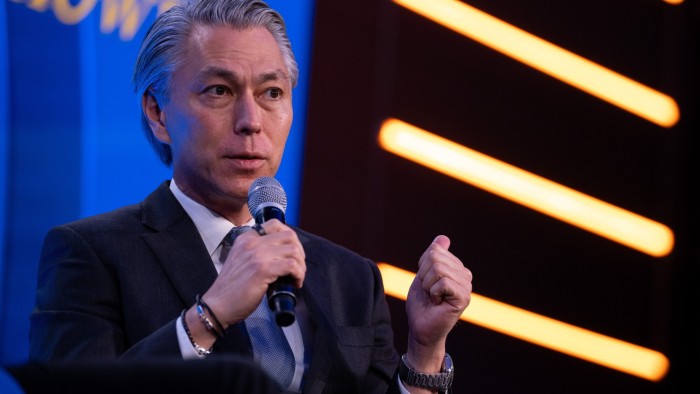Unlock the White House Watch newsletter for free
Your guide to what the 2024 US election means for Washington and the world
US protectionism under president-elect Donald Trump risks delaying the global shift to green energy, according to the chief executive of miner BHP.
Trump’s proposed import tariffs and the rising risk of a global trade war present a “key challenge for the energy transition”, Mike Henry told the Financial Times.
Australia-based BHP owns the world’s biggest copper mine, one of the metals crucial to the decarbonisation of energy systems because it is needed for components in technologies ranging from electricity cables to wind turbines and solar panels.
The geopolitical fallout from US policies would make “capital slower to mobilise to develop the metals and minerals supply that the world needs” to deliver the energy transition, Henry said in an interview in Paris.
Measures such as trade tariffs risked tempering “the aggressiveness with which some countries will pursue the energy transition”, said Henry.
The warning adds to growing fears that Trump’s protectionism poses a threat to the green transition, exacerbating challenges such as under-investment in critical supply chains and the slow development and permitting of clean energy projects.
Renewable energy has grown rapidly, with capacity additions increasing by more than 60 per cent in 2023 from a year earlier, the fastest growth ever recorded. But even before Trump’s victory in November, the pace of growth had slowed due to higher interest rates and other hurdles including strained supply chains.
Trump won a sweeping electoral victory after campaigning on a pledge to apply levies of up to 60 per cent on imports from China, one of BHP’s biggest markets.
“It’s essential for the world that the supply of metals and minerals needed to support not just the energy transition but population growth, urbanisation [and] rising living standards is met in as timely a fashion as possible and at lowest possible cost,” said Henry.
BHP is building its portfolio of commodities around such “future-facing” trends, with a primary focus on copper. “Already, we hold the world’s largest resources, but the commodity is so attractive we want to grow further,” said Henry.
The BHP chief said copper was the main driver of the company’s recent $39bn takeover pursuit of UK rival Anglo American, which would have given the combined entity control of a tenth of global copper production.
Although the takeover attempt failed in May, the six-month standstill period mandated by London’s takeover rules has now ended, freeing BHP to consider a renewed bid.
Henry declined to confirm plans for another acquisition attempt, but stressed that “there’s no M&A transaction that’s a must-do for BHP”. Instead, the company was focused on “organic and earlier-stage opportunities”, including its joint acquisition of Argentine copper miner Filo with Canada’s Lundin.
BHP has invested $11bn into the Jansen potash mine in Canada, which will give it control of 10 per cent of the global market for the key component in fertiliser by the early 2030s.
Henry said BHP could withstand any fallout of Trump’s protectionist policies on the mining industry. While such measures were “bad generally for the global economy and for commodities”, BHP was more resilient “than most mining companies”, he added.
BHP’s major operations in Australia, Canada and Chile all benefit from free trade agreements with the US, which helped give the company a competitive edge over rivals, Henry said.
He pointed to measures such as the Inflation Reduction Act — a subsidy package introduced under outgoing President Joe Biden designed to boost renewables in the US — as a potential counterweight to some of the challenges facing the mining sector, offering support for opportunities created by the energy transition.
Trump has vowed to pull the plug on these subsidies when he takes office in January, as well as pledging to end offshore wind and bolster the fossil fuel industry.
Additional reporting by Rachel Millard in London
Read the full article here

